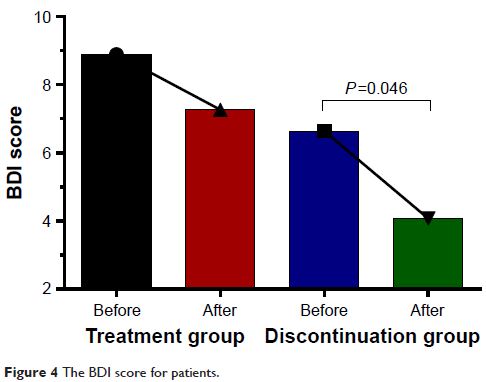109568
论文已发表
注册即可获取德孚的最新动态
IF 收录期刊
- 3.4 Breast Cancer (Dove Med Press)
- 3.2 Clin Epidemiol
- 2.6 Cancer Manag Res
- 2.9 Infect Drug Resist
- 3.7 Clin Interv Aging
- 5.1 Drug Des Dev Ther
- 3.1 Int J Chronic Obstr
- 6.6 Int J Nanomed
- 2.6 Int J Women's Health
- 2.9 Neuropsych Dis Treat
- 2.8 OncoTargets Ther
- 2.0 Patient Prefer Adher
- 2.2 Ther Clin Risk Manag
- 2.5 J Pain Res
- 3.0 Diabet Metab Synd Ob
- 3.2 Psychol Res Behav Ma
- 3.4 Nat Sci Sleep
- 1.8 Pharmgenomics Pers Med
- 2.0 Risk Manag Healthc Policy
- 4.1 J Inflamm Res
- 2.0 Int J Gen Med
- 3.4 J Hepatocell Carcinoma
- 3.0 J Asthma Allergy
- 2.2 Clin Cosmet Investig Dermatol
- 2.4 J Multidiscip Healthc

慢性乙型肝炎患者接受抗病毒治疗和脱离治疗期间与健康相关的生活质量
Authors Xue X, Cai S, Ou H, Zheng C, Wu X
Received 9 November 2016
Accepted for publication 1 December 2016
Published 12 January 2017 Volume 2017:11 Pages 85—93
DOI https://doi.org/10.2147/PPA.S127139
Checked for plagiarism Yes
Review by Single-blind
Peer reviewers approved by Dr Lucy Goodman
Peer reviewer comments 2
Editor who approved publication: Dr Naifeng Liu
Introduction: Health-related quality of life (HRQoL) has emerged as an important
consideration in the care of patients with chronic hepatitis B (CHB). However,
whether benefits from the improved HRQoL that occurs after antiviral treatment
or drug discontinuation outweigh the risks of viral relapse is an unanswered
question. The aim of this study was to evaluate the HRQoL among patients with
CHB during antiviral treatment and withdrawal of treatment.
Patients and methods: There were 102 patients who met the enrollment
criteria with 54 patients in the treatment group and 48 patients in the
discontinuation group. Sociodemographic information was collected. The 36-Item
Short-Form Health Survey (SF-36), European Quality of Life-5 Dimensions, and
Beck Depression Inventory (BDI) were adopted to evaluate life quality and
mental health.
Results: In the treatment group, SF-36 showed
that the physical functions were significantly increased. In the discontination
group, the psychological functions showed improvement. A multivariate
regression analysis indicated that baseline SF-36 score was a predictor for
improvement in HRQoL (odds ratio =1.17, P =0.003) and baseline BDI score
was a factor for remission of depression (odds ratio =0.75, P =0.005) after
medical intervention. When the cutoff value of SF-36 score was set at 79.5, the
sensitivity and specificity to predict improvement in HRQoL were 82.8% and
74.0%, respectively. When the cutoff value of BDI was found as 8.5, the sensitivity
and specificity to predict alleviation of depression were 58.6%, and 76.0%,
respectively.
Conclusion: Antiviral treatment benefits the
physical health of the patients with CHB, while conferring no obvious
improvement in their psychological condition. Improved psychological
interventions for patients with CHB, especially for those with lower baseline
SF-36 scores and higher BDI scores, may improve their quality of life.
Keywords: chronic hepatitis B, health-related
quality of life, antiviral treatment, mental disorder, depression
